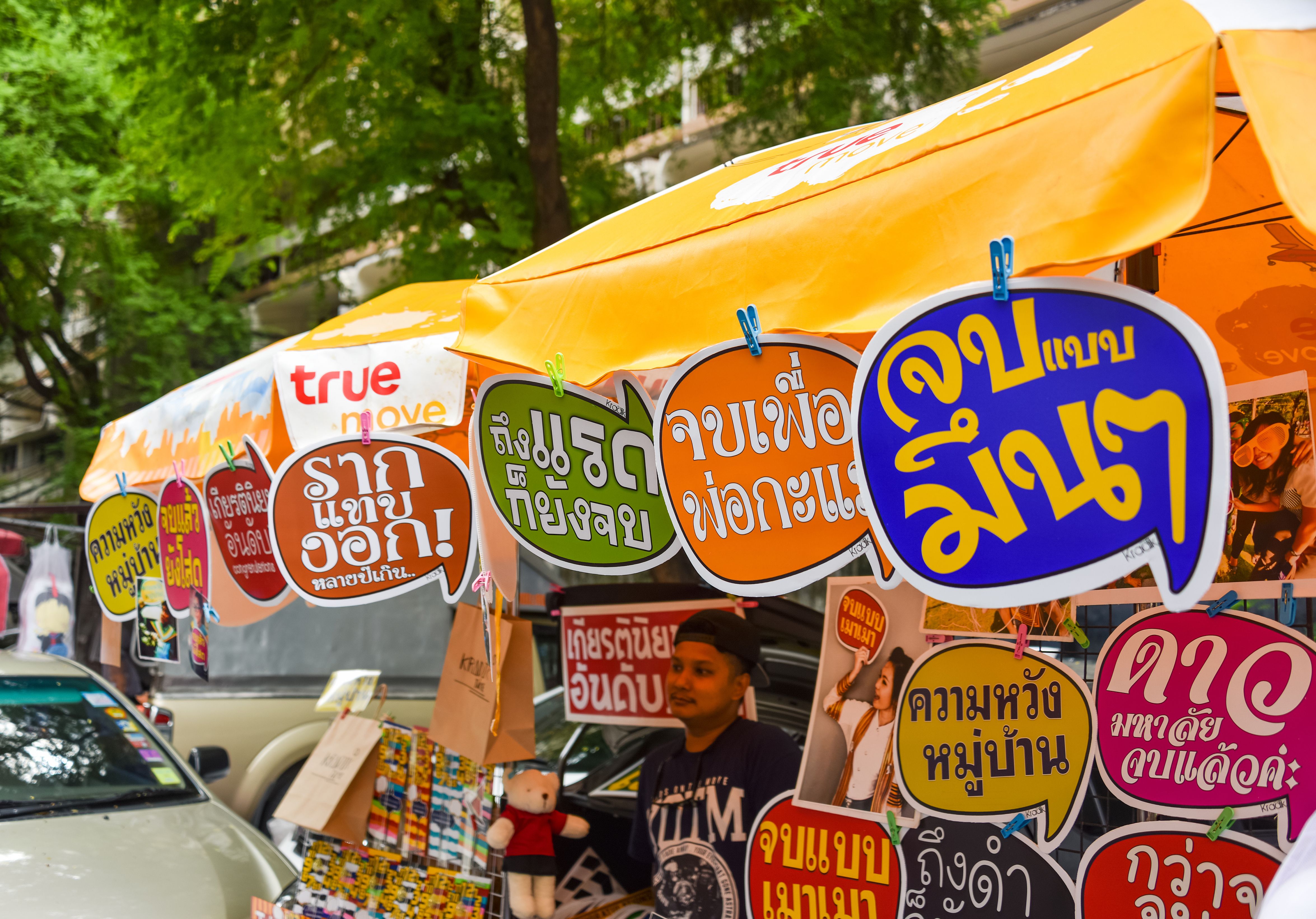Hanging out with fellow travelers on the beach, Khao San Road, or at Full Moon parties is one of the joys of visiting Thailand. However, if you want to have a more profound experience and take part in adventures unavailable to most visitors, then you should learn to speak some Thai. The language, with its seemingly curlicue letters may look difficult at first glance, but with language apps, Youtube videos, and lessons via Skype, learning Thai is actually quite easy, and it’s highly recommended and possible to learn the language before setting foot in Southeast Asia.

Why you should learn Thai

Photo: puwanai/Shutterstock
You’ll make friends with the locals.
The number one benefit of learning Thai is the ability to meet and communicate with local people. If you want to explore the less-visited sides of Bangkok, remote beaches in the south, or the countryside of the north, Thai language skills are essential to getting the most out of the experience. Away from the touristy areas, English is almost non-existent, but the people are friendly and curious. Travelers who make an effort to use Thai are likely to get invited to drink a beer, share a meal, or go to a festival — speaking Thai can literally open doors in the Land of Smiles.
You’ll get the best grub.
Although many restaurants have English menus, if you want the tastiest Thai food, and save some baht in the process, being able to speak Thai is the key. The most delicious food in Thailand is often found at street carts or in hole-in-the-wall restaurants that appear intimidating to tourists. Learn how to read the names of the dishes, and the amazing food will be there for the taking.
Amazing street food is everywhere in Bangkok, but some of the best places to eat with the locals include the Nang Loeng Market, the Victory Monument, and Silom Soi 20. The Nang Loeng Market is a large food court in a neighborhood of traditional shophouses about a 20-minute walk from Khao San Road. The busy Victory Monument is a transportation hub frequented by locals on the go. The boat noodle shops on the northeast side of the roundabout are an excellent place to start. Silom Soi 20 is a narrow street lined with inexpensive food stalls that is a great escape from the expensive restaurants of the area.
You’ll avoid hassles and scams.
Two of the biggest scams in Bangkok are tuk-tuk drivers who take passengers to shops and pressure them to buy, and taxi drivers who try to avoid using the meter with tourists. By using your language skills to negotiate and clarify the destination in advance, you can prevent these problems. Also, in downtown Bangkok and the touristy beaches, you may get approached by unscrupulous touts or con artists offering tours or services. Tell them, “Ma jak Khrueng Tep,” I am from Bangkok, and they will laugh and retreat like a vampire exposed to garlic.
Basics of the Thai Language

Photo: 9’63 Creation/Shutterstock
Thai poses challenges to English speakers:
- There are almost no shared words between the languages.
- In Thai, the personal pronoun “I” is gender specific. Women say chan, men say pom. In addition, Thai women usually end each sentence with kha and men end the sentence with khrap to make it softer and more polite.
- The written Thai language uses a unique script that looks nothing like the Latin alphabet. But once you know the letters, what you previously thought were squiggles will make perfect sense.
- Thai has five tones: mid, high, low, rising, and falling — and how you say a word can change its meaning. It is important to learn the tones and try and use them correctly so that people will understand, but often they can infer by context. For example, sua with a rising tone means tiger, and sua with a falling tone means shirt. If you go to a laundromat, chances are the clerk will understand that you don’t want to clean your tiger.
Luckily, Thai is a simple and straightforward language. There are no articles or plurals, and the verbs never change form. For example, In English, we say, “I went to the beach yesterday.” In Thai, they say, “I go beach yesterday.”
Learning Thai — Where to start
A great first stop is iwanttolearnthai.com, a website by Bo, a Thai language teacher. The site has audio, video, and written lessons, plus a collection of vocabulary lists. There is also a section entitled Speak like a Thai with 365 useful lessons — one for every day of the year.
Another essential website is thai-language.com, which has the best Thai translator and dictionary on the web. Each word has a page with sentence examples, synonyms, and antonyms. The translations on the webpage are 100 percent accurate. The thai-language.com app is a handy tool to have on your phone to look up words on the fly.
Some additional websites, podcasts, apps, youtube channels, and books to learn Thai with ease include:
- Mod
Mod has over 100 videos that teach practical tips to tourists, including how to give directions to a taxi driver and vocab for Thai massage. Of course, you can always scream “OUCH” during your treatment and be understood, but to say it in Thai may lead to quicker relief.
- Thai Pod 101
The Thai Pod 101 website has over 1,000 lessons, and the YouTube channel has over 450 free videos that focus mostly on conversation and vocabulary building.
- Nemo
Nemo is a fun and useful app designed for use during small periods throughout the day. The app has audio and written vocabulary lists and a recording function that allows you to record and hear your voice next to that of a native speaker.
- Thai for Beginners by Benjawan Poonsam Becker
If you prefer learning on paper books, Thai for Beginners by Benjawan Poonsam Becker is the best on the market; the book teaches reading, writing, and conversation in an easy-to-follow manner.
- Skype
Learning with a native speaker via Skype before you come to Thailand is not only cheap but also one of the most effective ways to learn. By using Skype, you get one-on-one instruction and don’t have to travel to a classroom to study. When conversing with a teacher on Skype, it is possible to share screens, send photos, and quickly look up words in online dictionaries. Plus, you can record the lesson and review it later.
Finding an online Thai teacher is simple. The best place to start is italki.com, which has a listing of Thai teachers with promo videos and prices. Learn Thai Style is another language program that connects Skype teachers to students.
If you want to save money or want supplemental speaking practice, consider arranging a language exchange with a Thai person. In a language exchange, you can meet via Skype and spend the first half of the time speaking Thai, and the second half speaking English. A language exchange will be different in that you won’t have a teacher, but it is a free option for those looking to practice speaking. Facebook groups such as Bangkok Expats or Everything Bangkok are an excellent place to look for interested locals.
Speaking Thai in Thailand

Photo: David Bokuchava/Shutterstock
Once in the country, dive in and start speaking. Don’t worry about making mistakes or saying everything correctly — Thai people are easy-going and happy that you are trying. Your efforts will most likely be rewarded by “Pud Thai gang mak!” (You speak Thai very well!)
Two phrases that will get you far while in Thailand are “hello” and “thank you.”
- “Hello” for female speakers — Sah-wah-dee kha
“Hello” for male speakers – Sah-wah-dee khrap
- “Thank you” for female speakers — Khàawp-khun kha
“Thank you” for male speakers — Khàawp-khun khrap
Thai people are mostly incredibly social and open, and often ask the same questions. Learn and rehearse the answers to these questions to make small talk easy.
- Where are you from? — Kun ma jak yuu tee nai?
- Are you married? — Kun deng-ngan leow reu yang?
- Do you have children? — Kun mee luk mai?
- Where are you traveling in Thailand? — Kun dtuen-tang bai nai?
- What are your favorite Thai foods? — Kun chop a-han Thai arai?
- Do you like spicy food? — Chop a-han pet mai?
- The weather is hot, right? — Ron, chai mai?